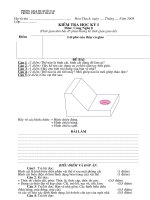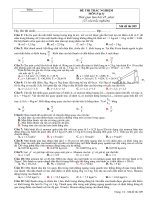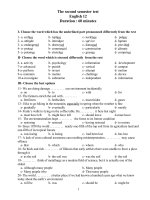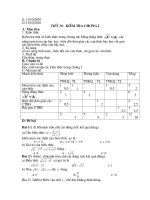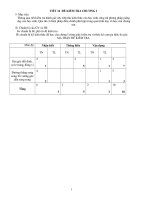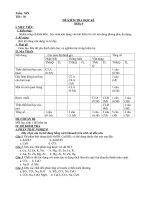Đề Kiểm tra HK2 - có ĐA
Bạn đang xem bản rút gọn của tài liệu. Xem và tải ngay bản đầy đủ của tài liệu tại đây (74.72 KB, 5 trang )
The second semester test
English 12
Duration : 60 minutes
I- Choose the word which has the underlined part pronounced differently from the rest
1- a. surface b- replace c- necklace d- palace
2- a- attitude b- introduce c- survive d- human
3- a- endangered b- destroyed c- damaged d- provided
4- a- protect b- commercial c- construction d- climate
5- a- potatoes b- stretches c- grasses d- comprises
II- Choose the word which is stressed differently from the rest
6. a. activity b- psychology c. information d. development
7-a- advanced b- punish c- vertical d- campus
8-a- perform b- invent c- attempt d- motion
9-a- maintain b- marine c- challenge d- device
10-a-investigate b- submarine c- independent d- information
III- Choose the best options
11- We are doing damage . . . . . . . . . our environment incidentally
a- on b- to c- with d- for
12- The farmers enrich the soil with . . . . . . . . .
a- fertilizers b- herbicides c- insecticides d- gases
13- I like to go hiking in the mountain, especially in spring when the weather is fine
a- gradually b- eventually c- particularly d- mostly
14- Frank’s wallet is lying on the coffee table. He . . . . . . . . . it here last night
a- must have left b- might have left c- should leave d-must leave
15- The environmentalists hope . . . . . . . . . the forest to its former condition
a- restoring b- restored c- having restored d- to restore
16- Since 1950 the world . . . . . . . . . nearly one-fifth of the top soil from its agriculture land and
one-fifth of its tropical forests
a- was losing b- is losing c- had been lost d- has lost
17- A lack of cross-cultural awareness can resulting misinterpretation , . . . . . . . . . may cause
offence
a- that b- which c- whom d- who
18- So thick and rich . . . . . . . . . of Illimois that early settlers there were unable to force a plow
through it
a- as the soil b- the soil was c- was the soil d- the soil
19- . . . . . . . . . think of metallurgy as a modern field of science, but it is actually one of the
oldest
a- Although many people b- Many people
c- Many people who d- That many people
20- The world . . . . . . . . . a better place if we had known a hundred years ago what we know
today about the earth’s environment
a- will be b- was c- should be d- might be
1
IV- Identify the one underlined word or phrase – a, b, c, or d – that must be changed for
the sentence to be correct
21- Scientists suggest that only one percent of the world’s extinct animals and plants has
identified
a b c d
22- Some underground water is enough safe to drink, but all surface water must be treated
a b c d
23- Because the expense of traditional fuels and the concern that they might run out, many
a b c
countries have been investigating alternative sources of power
d
24- Disease, pollute, and limited distribution are factors that threaten various plant and animal
species a b c d
25- When we visited the museum, we were not allowed taking photographs so we found it a little
uncomfortable a b c d
V- Fill in each numbered blank with ONE suitable word
CARE (Cooperative for American Relief Everywhere) was (26) _______ in 1945 to help
people after World War II. It (27) _______ over one hundred millions food packages.
Meanwhile, it started self-help programs. Today, it has development programs in thirty-seven
countries.
CARE gives equipment and teaches people how to build water systems, roads, schools, houses
and (28) _______ centers. It also teaches people how to increase (29) _______ on their farms,
how to (30) _______ areas, and how to start small village industries.
Doctor and nurses (31) _______ to go to remote villages. They provide health (32) _______
for the villagers. They also teach them how to (33) _______ their health. They train people to
provide simple medical care.
CARE also provides food for about thirty million people each year and (34) _______ of them
are children. It gives special help when there is a flood, an earthquake, a (35) _______, or a war.
26. a. made b. organized c. deleted d. undergone
27. a. distributed b. parachuted c. overused d. improved
28. a. health b. healthy c. healthful d. healthiness
29. a. contribution b. collaboration c. consumption d. production
30. a. recover b. reforest c. refresh d. restrain
31. a. defend b. compete c. volunteer d. eliminate
32. a. care b. beat c. limitation d. mention
33. a. solve b. improve c. establish d. conserve
34. a. almost b. either c. most d. altogether
35. a. drought b. shower c. stream d. brook
VI- Read the passage carefully and then choose the best answers
Sea ice is commonly found in the Arctic and Antarctic where low air and water temperature
provide ideal conditions for ice formation and growth.
2
Salinity, the amount of salt in seawater, determines the temperature at which seawater
freezes. Although seawater is usually very salty, sea ice is practically salt-free. Why is this ?
When the water temperature dips to its freezing point (about 28.6
0
F), tiny ice particles form. Salt
is not part of the ice crystals’ molecular, so it is gradually released into the surrounding water.
However, in extremely cold water, ice freezes rapidly, so salt cells are sometimes trapped before
they are discarded. The cells then “migrate” through the ice, a process which takes up to a year.
As ice crystals multiply, the water turns slushy and the surface freezes into thin sheets of ice.
Wind and wave action break the sheets into pieces, put them together, and freeze them into thick
solid masses of pack ice. Depending on the severity of the winter, the pack’s thickness is usually
nine to ten feet. Pieces breaking from the pack present the greatest threat to ships transiting
through polar water.
The Arctic produces 10,000 to 50,000 icebergs annually. The amount produced in the
Antarctic region is inestimable.
36- Sea ice is seen ___________
a- everywhere on the earth b- in the Arctic and Atlantic
c- in the Antarctic d- in the poles of the earth
37- The temperature at which seawater frees is determined by ___________
a- low air b- salinity c- sea ice d- seawater
38- Sea ice ___________
a- contains no salt b- is usually very salty
c- is more salty than seawater d- makes the temperature decrease
39- Salt can be released ___________
a- immediately after the tiny ice particles are formed
b- rapidly in extremely cold water
c- gradually after a long time
d- slowly during the melt of the ice sea
40- Which sentence is true ?
a- The thick solid masses of pack ice are formed from the ice crystals
b- The pieces of ice breaking from the pack ice can be seen by ships transiting through polar
water
c- Every year, the icebergs produced in the poles increase
d- The writer wants to say that we should go to the Antarctic to see the icebergs
VII- Choose the best options
41- It’s a pity that you didn’t tell us about this.
a- I wish you told us about this
b- I wish you would tell us about this
c- I wish you had told us about this
d- I wish you have told us about this
42- My brother and I went to that school.
a- I went to that school and my brother, too.
b. I went to that school and so my brother did.
c- I went to that school and so did my brother.
d. I went to that school and so my brother did, too.
3
43- The sign says, “Keep off the grass.”
a- The sign says, “Have someone cut the grass immediately.”
b- The sign says, “Don’t walk on the grass.”
c- The sign says, “Grass should not be grown here.”
d- The sign says, “Water the grass, please.”
44- When I met my long-lost brother, I was at a loss for words.
a- When the speaker met his brother, he was puzzled about what to say.
b- When the speaker met his brother, he had much to say.
c- When the speaker met his brother, he refused to say anything.
d- When the speaker met his brother, he had nothing pleasant to say.
45- Donald could not help weeping when he heard the bad news.
a- Donald could not stop himself from weeping at the bad news.
b- Donald could not allow himself to weep at the bad news.
c- Donald could not help himself and so he wept.
d- Donald could not help himself because he was weeping.
46- Cancer and AIDS / untreated / now / be cured successfully.
a-Cancer and DIAS, which are untreated now, they will be cured successfully
b-Cancer and DIAS, they are untreated now, will be cured successfully
c-Cancer and DIAS, that are untreated now, will be cured successfully
d-Cancer and DIAS, which are untreated now, will be cured successfully
47- All school / on earth / equipped / computers / and the Internet
a- All school on earth to be equipped with computers and the Internet
b- All school on earth will be equipped by computers and the Internet
c- All school on earth will be equipped with computers and the Internet
d- All school on earth to be equipped by computers and the Internet
48- Primary and secondary / education / compulsory / all children
a- Primary and secondary education is compulsory for all children
b- Primary and secondary educations are compulsory for all children
c- Primary and secondary educations are compulsory to all children
d- Primary and secondary educations are compulsory with all children
49-We / dependent / nature /cannot survive ourselves / without wildlife
a- We are dependent on nature and so cannot survive ourselves without wildlife
b- As we are dependent on nature and we cannot survive ourselves without wildlife
c- We are dependent on nature and therefore cannot survive ourselves without wildlife
d- We are dependent on nature and cannot survive ourselves without wildlife
50- We / destroy / our environment / so / many species of plants and animals / extinction
a- We destroyed our environment, so many species of plants and animals are in danger of
extinction
b- We have been destroying our environment, and many species of plants and animals are in
danger of extinction
c- We have destroyed our environment, so many species of plants and animals are threatened
of extinction
d- We destroy our environment every day , so many species of plants and animals are in
threatened with extinction
4
Key
1 2 3 4 5 6 7 8 9 10 11 12 13
b c d b a c a d c a b a c
14 15 16 17 18 19 20 21 22 23 24 25 26
a d d b c b d d b a a b b
27 28 29 30 31 32 33 34 35 36 37 38 39
a a d b c a b c a d b a c
40 41 42 43 44 45 46 47 48 49 50
c c c b a a d c b d b
5
